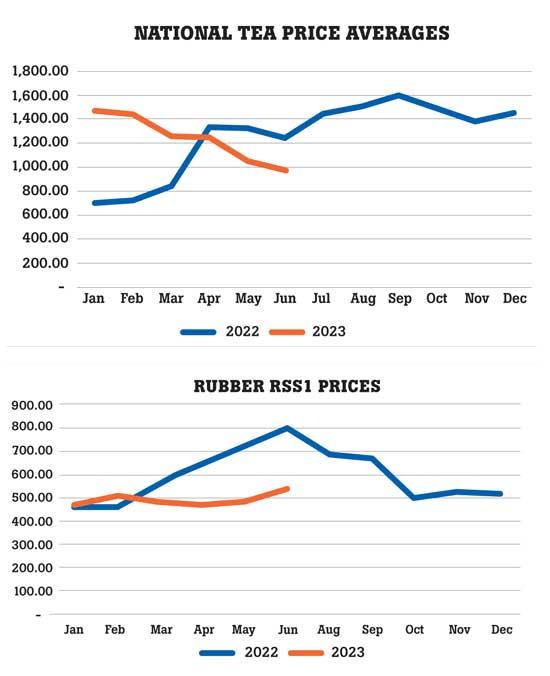Reply To:
Name - Reply Comment
 As the price dynamics for tea and rubber show strong signs of a continuing downturn over the past six months, the Planters’ Association of Ceylon (PA) yesterday asserted that the plantation industry is in urgent need of “realignment”.
As the price dynamics for tea and rubber show strong signs of a continuing downturn over the past six months, the Planters’ Association of Ceylon (PA) yesterday asserted that the plantation industry is in urgent need of “realignment”.
It renewed its call to the government to look at other lucrative crops such as oil palm, since a sharp reduction is seen in the prices of tea and rubber in the first half of 2023.
The tea prices have been impacted by the increasing production in the competitor nations, while the rubber prices are affected by the continuing supply-demand mismatches in the wake of the COVID pandemic.
The demand for finished rubber products, which is showing marginal improvement, has been relatively stagnant compared to the past three years.
Adding to the woes is Sri Lanka’s low productivity, which is eroding its ability to compete with larger regional producers.
“While we maintain that there must always be a place for Sri Lankan tea and rubber, we have to acknowledge that securing the future of our nation’s plantation industry requires extensive crop diversification.
We can no longer limit ourselves to just two main crops. Already significant investments are being channelled across the Regional Plantation Company (RPC) sector into an array of crops – from a wide range of fruit cultivation to coffee and even several varieties of berries,” PA Chairman Senaka Alawattegama said in a statement to the media.
He stressed on his “disappointment” over the continued lack of progress in expanding sustainable oil palm cultivation.
According to the PA, oil palm is well understood to be significantly more profitable than tea and rubber. Based on the 2020 data, on average, oil palm generates a profit per hectare of Rs.605,000, as compared with Rs.269,600 for coconut.
By contrast, both tea and rubber are currently generating losses. This in turn means that oil palm can generate significantly larger volumes of foreign currency earnings, utilising significantly less land and other agricultural inputs.
However, Alawattegama pointed out that there is an “extremely narrow” window in which the RPCs are able to re-establish oil palm nurseries and planting of mature seedlings.
Once monsoon conditions set in, the RPCs would be locked out of any further progress on oil palm cultivation until next year, he explained. “Given that the government has already acknowledged the need for replanting the existing oil palm and expanding our current capacity, it is essential that the relevant policymakers take urgent action to empower the RPCs to move ahead.
Especially given our expectation of unfavourable price dynamics over the remainder of the year and the ongoing downturn in Sri Lanka’s export revenue, as a nation, we cannot afford to delay any further,” Alawattegama said.